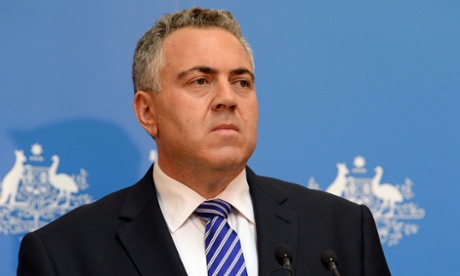
Good night everyone
After a marathon 24 hours, I think we'll shut blog shop for tonight. Thank you to the readers for your stellar company today, both here on the live blog and on Twitter. Thanks to Mike Bowers and Christian Bennett and to my colleagues in the Canberra bureau for their generous contributions on the two biggest days of the political year – budget day, and the day after budget day. You all rock.
Let's summarise where we've ended up at close of business.
- Tony Abbott and Joe Hockey grabbed every open microphone in the country to sell their first budget.
- Given the measures in their first budget, this was always going to be a tough ask.
- The premiers, having twigged to the budget decision to cut $80bn over ten years from grants for health and education, went berko.
- NSW, Victoria and Queensland said the budget ploy by Canberra was a cost shifting swifty designed to force them all to push for an increase in the GST.
- That read looks pretty much right, given Abbott is certainly not ruling out a GST hike if all the states all agree.
- Campbell Newman promptly demanded a special COAG meeting to thrash it all out. WA premier Colin Barnett said no thanks, because he didn't like travelling to Canberra.
- Tony Abbott told them all to grow up.
- Meanwhile, in the other circus, the parliamentary circus – the government faces an uphill battle to get its co-payments for medical visits through the senate given Labor, Greens and Clive Palmer are opposed to them.
- Labor is still not saying what it will do in the deficit tax.
- It's possible we'll discover that tomorrow, when Bill Shorten is due to deliver the budget address in reply.
- Groups representing pensioners, young people and welfare recipients continued to vent their fury over the key budget measures.
- The government spent much of the day trying to argue that anyone who asked them to account for their misleading statements prior to the last election was a process obsessive, a politics obsessive – unconcerned with sensible economics.
- The opposition said – are you kidding?
- Clive Palmer said given the voters were comprehensively conned prior to the last election, a new election could be in order.
Don't grab the smelling salts yet. It's too early.
That's about it, I reckon. Have a great evening. See you in the morning.
A few more frames from Mike Bowers from Question Time today.
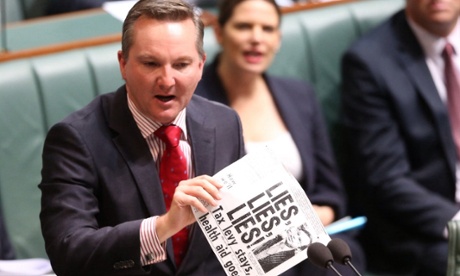
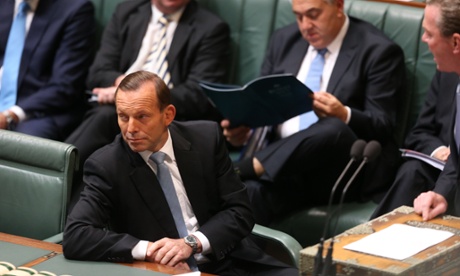
I see news.com has hopped into Vilma (who now has a surname, Ward) – the lady who took on the prime minister on breakfast television this morning. That report declares: "Mrs Ward is not just an average pensioner from Queensland; she is Labor’s go-to granny for media events and one of the biggest fans of former PM Kevin Rudd."
Labor's go-to granny?
Boy, we could all use one of those.
Fairfax Media has also tracked Vilma down for a word. Mrs Ward told Damien Murphy that despite her friendship with Kevin Rudd, she had not been a party member for 40 years because they “told me I should think Labor and act Labor at all times".
Vilma I suspect is like all of us, more than the sum of her parts. And I reckon from the TV performance this morning, Vilma is an independently minded soul, whatever her prevailing political stripe. Here's a bit more background which might lend weight to this point.
Updated
The ABC is telling me that the former prime minister, Kevin Rudd, has arrived to give evidence at the royal commission into the former government's home insulation scheme.
My colleague Helen Davidson, is in Brisbane for the inquiry. She watched evidence earlier today from the former environment minister Peter Garrett, who said he was “gutted” when the first death occurred under the home insulation program.
Matthew Fuller was electrocuted while installing insulation in October 2009. He was the first of four men who would die while carrying out the work subsidised by the federal government's economic stimulus package.
Time to start the resistance to the destruction of Australian society @palmerunited #budget2014 #auspol #resistance
— Clive Palmer (@CliveFPalmer) May 14, 2014
Sadly, I don't think Clive is listening, Christopher.
(Everything really is a bit topsy turvy, isn't it? When the billionaires invoke the resistance hashtag?)
The education minister Christopher Pyne is now channeling the voters in the Sky News studio. Earlier today he informed the opposition leader that voters thought he was a whinger. Now Pyne informs Sky political editor David Speers that voters don't want people like Clive Palmer calling for fresh elections.
They will not welcome minor parties threatening bellicose action over things we've been elected to do.
Just because there's not quite enough politics in today, Clive Palmer thinks a new election is "not uncalled for" on the basis that the voters were told one thing before the last election, and another thing after it.
I did neglect to mention during Question Time that speaker Bishop clocked up a milestone. She's ejected 100 Labor MPs from the chamber since taking the chair.
The manager of opposition business Tony Burke noted that Bishop's scorecard now read Labor: 100, Coalition: Zip.
Bishop noted rather tartly she not in fact ejected 100 separate MPs because Labor didn't have 100 MPs in the chamber. If it had 100 MPs, it would be in government, not in opposition.
If you had 100 members you'd be in government and sitting on this side.
You simply have some recurrent offenders.
I'm sorry, but after the last 24 hours, we all deserve this.
I want to see you all up from your desks, and your iPads, going for it.
Normal politics transmission will resume shortly.
I gather while I've been delivering you the day in ten minute intervals – dancing gate has been a matter of contention.
The treasurer was confronted by the Nine Network's political editor Laurie Oakes to explain why he had been dancing ahead of an austerity budget. Benefit recipients wouldn't be dancing, now would they?
Dancing in the office obviously follows that cigar picture which broke the internet late last Friday.
Hockey tries to say he was just happy to see his son, who he'd not seen for three weeks.
Oakes is clearly not amused.
Here's the clip, thanks to our friends at Nine.
Today, it's all in the jab.
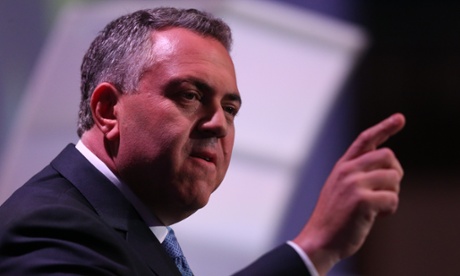
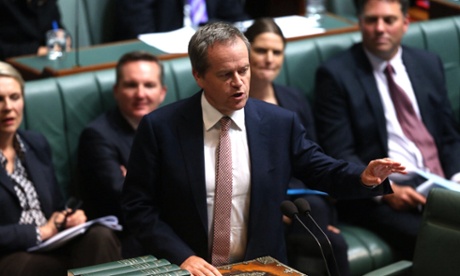
With that character assessment, further questions have been placed on the notice paper.
This is Abbott's response to broken promises. He says the voters kicked Labor to the kerb last September because they were a rabble. Now they've got a government that will get the job done.
Abbott:
After six years of dysfunction, the people of Australia were looking for some leadership. They were looking for a government that was prepared to make not the easy decisions but the hard decisions.
Madam speaker, the people of Australia were looking for leadership and, Madam speaker, last night they found it.
Pyne picks up the point in his next Dorothy Dixer – his implication to Labor is the voters aren't buying what you are selling. It seems everyone who doesn't agree with the government today is petulant. The premiers are petulant. And so is Shorten according to the general rationale.
Pyne:
(Shorten) will have to stop being the number one whinger in Australia. He will have to start having solutions rather than being all complaint and no responsibility.
If the number one whinger in Australia was reality TV show, there would be no point in any other contestant entering it because if Bill Shorten entered it he would win it.
The Labor leader bowls this one up.
Q: My question is to the PM. During this question time on eight occasions the prime minister has lacked the courage to admit that he broke his promises. Enough is enough. Will this prime minister come to the dispatch box, look Australians in the eye and apologise for his lies?
The Speaker, Bronwyn Bishop, bristles.
The leader of the opposition will withdraw unparliamentary language.
Shorten.
Madam speaker, every Australian knows the truth.
Bishop.
I said the member will withdraw.
Shorten.
I withdraw.
Bishop says try again.
Shorten:
Will the prime minister now admit that he has broken his promises to and apologise to the Australian people for misleading them?
Bishop.
Misleading didn't help either. There are other forms of the house.
Shorten.
I am happy to get the thesaurus out. Australians know it's fabrication, untruth – he didn't say what he was going to do before the election. Will he apologise?
Bishop lets that one through.
Oh dear. I think the member for Fairfax may have lost interest.
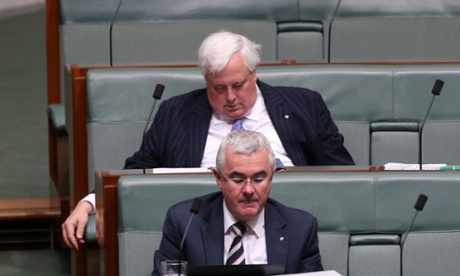
Ah, the humanity.
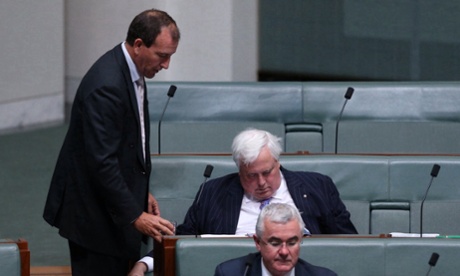
A Dorothy Dixer just then to the health minister Peter Dutton, which can best summarised as why does Labor hate science.
Shadow health minister Catherine King has a question best paraphrased as why do you hate sick people.
Tony Abbott:
The shadow minister says that somehow I am unfit for office because I support a co payment.
As economists have shown, the ideal model involves a small co-payment, not enough to put a dent in your weekly budget, but enough to make you think twice before you call the doc .. and the idea is hardly radical.
(Ah yes, we are working up to an argument once proposed by Labor's Andrew Leigh, now shadow assistant treasurer.)
Madam speaker, who said that? The shadow assistant treasurer!
The education minister Christopher Pyne has told the chamber he's delighted to inform everyone that the Coalition is keeping all its election commitments. (Except, presumably, that one about not increasing university fees. That's my note, not Christopher's.)
The prime minister meanwhile, is talking about the values of the budget.
This budget enshrines two great Australian values - the fair go .. and the 'have a go' value that we want to encourage.
They are the values that are embodied in this budget.
Shorten is back on pensions.
Q: My question is to the PM. Before the last election, indeed on the very last night before the election, the PM explicitly promised no change to pensions. Last night the budget revealed the pensions will be cut. Why should pensioners pay for the PM's deceit?
Now this is a very big call on a very cluttered day, but I reckon this Abbott formulation goes close to quote of the day. Look at the construction in italics.
The prime minister:
Madam speaker, the leader of the opposition, if I may say so, should get his facts right.
Pensions aren't being cut but, after the next election, if this government is re-elected, pensions will grow at a somewhat slower rate because they will be indexed to CPI rather than a male total average weekly earnings.
Hockey has a flick going on the broken promises questions. All day, he's been brushing off broken promises questions as a political critique, not a substantive one.
The treasurer, from a moment ago.
All the criticism from Labor thus far has been political. None of it is about the policy. They are all politics, no economics. They are all politics, no policy. Come on and debate these things. Let's debate the issue in relation to the ageing demographic.
It's all pretty transparent, this.
It's an effort to minimise the damage. According to this Hockey spin, people asking questions about broken promises are just process oriented pedants. Politicos. People who don't live in the real world. You feel that, right?
Nice try Joe. Critics of the budget are of course critical on two fronts: there is criticism of the measures, and there is criticism about the morality of people saying one thing before and election, and another thing after it. Particularly when those people pre-election set great store on the morality of keeping election commitments.
Hockey is using a Dorothy Dixer to say budget repair is all Labor's fault. This is 1996 all over again. Don't look at me. Look at them. The treasurer:
The Coalition government is elected, Labor doesn't tell the full story about what the budget is and of course in those days it was a $96bn debt, $10bn black hole, the Beazley black hole. But this time around they've exceeded their record. Labor has exceeded its record. On this occasion, 667 billion dollars of debt, and $123bn of deficits.
Shorten is back.
Q: My question is to the PM. Today the NSW premier Mike Baird said this about the budget last night, that it's ripping $80bn out of schools and hospitals. In fact he said, 'What we saw last night from Canberra was a kick in the guts to the people of NSW.' Why should the people of NSW suffer from the PM's pre-election deceit?
Abbott's response is basically tissue for your issue chaps. The prime minister adopts the vocal intonation I periodically refer to as the bedtime story voice. Obviously someone is having a tantrum.
I think the prime minister is essentially telling the premiers to stop blubbering.
Abbott:
We will not be bound by Labor's unsustainable spending commitments. We are not going to be bound by the budget booby traps that members opposite put in.
They are state government-run public hospitals, they are state government-run public schools, the state governments also need to take more responsibility for these in the future – as is right and proper.
What the people of Australia expect is a grown-up adult governments in the states – just as they've now got a grown-up adult government in Canberra.
That's as it should be.
The first Dorothy Dixer of the session essentially invites the prime minister to congratulate himself on his budget effort. Abbott obliges.
Then Chris Bowen returns.
Q: My question is to the treasurer. I refer the treasurer to his previous answer, and his answer on the '7:30' last night when asked, 'Now we know that a co payment, a levy and a tax are all taxes by another name?' And the treasurer's response, 'Of course they are.' Will the treasurer now concede that his election campaign was a deceit on the Australian people?
Hockey:
Ah, no.
Now back to the budget slug-fest.
The shadow treasurer, Chris Bowen.
Q: I refer the treasurer to his admission on ABC 7:30 last night that the new GP payment and the income tax levy are taxes. I also refer the treasurer to both his and the PM's repeated promises before the election that there would be no new taxes under the Coalition government. After this deceit, how can the Australian people ever believe anything the Treasurer or the PM have to say?
The treasurer, Joe Hockey:
I didn't say that.
Labor argues the toss about Hockey not saying that, given he certainly appeared to say that.
Hockey again:
The interviewer asked me and put a whole lot of things into that question and assumed that the answer was relevant to that particular point.
Yeah, nah, thinks the opposition. You did say it.
Hockey again, attempting to turning those tables.
If as the member for McMahon says the question is about deceit, I would ask him to explain why we ended up with $123bn of deficits. Ask him why we ended up with $667bn of debt.
And why is it the case that the member for Lilley never actually delivered four surpluses in a row! If it's the case if we're going to have a discussion about deceit – I would suggest the Labor Party is standing on very thin ice.
Question time
The prime minister opens the hour of glower by saying he is deeply concerned by events in Nigeria – the kidnapping of the school girls.
Tony Abbott says Australia will ban Boko Haran as a terrorist organisation.
The Labor leader Bill Shorten is a unity ticket on this issue.
We offer every support possible to the Abbott government, we must do all that we can to assist.
Just before the Question Time pivot, the West Australian premier Colin Barnett is the latest premier to be cranky about the budget's cost shifting swifty by Canberra.
But he's less cranky than Baird and Newman. Barnett is asked whether he supports a special COAG meeting (as suggested this morning by Newman.)
No I hate going to Canberra.
(Take a bow Colin.)
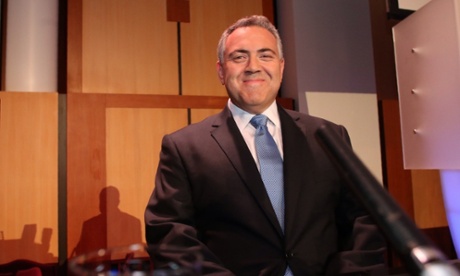
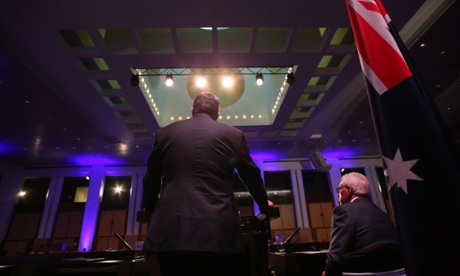
Updated
There were a couple of questions there that I couldn't quite stretch to, but I'm confident we caught the main points.
That's a wrap now. Question Time looms at 2pm.
Q: Are you confident of getting one million jobs created in the next five years?
Hockey:
The answer is yes, we want to do that.
Q: You have applied a $7 Medicare co-payment to GP visits. That would seem likely to encourage more people to go to a hospital emergency department when they are sick to avoid paying that fee. That also seems to support the argument the states are making about cost shifting. For the record, should people be able to go to a hospital emergency department for free now that they would have to pay a GP fee as an alternative – or should the states apply a fee to those visits?
You are asking questions that the states should answer because they run the hospitals, we don't.
The Hockey questions continue. He's asked about a tradie who might not be able to find a job, then finds himself with no income because he can't get the dole.
The treasurer says that tradie must learn or earn.
He's then asked whether the government should do more about transparency given the various controversies about lobbyists and influence peddling. Should the treasurer, for example, publish his diary?
Hockey:
If I published my ministerial diary, it would be meeting, meeting, meeting, public servant. I would be happy to document I spoke to Margaret from Langwarrin. You know, I think people that tried to lobby me would be sorely disappointed with the budget. Didn't work for them.
Meanwhile ...
Prof Palmer "setting the truth free" on #Budget2014 @murpharoo pic.twitter.com/4t9F7HS6b8
— Daniel Hurst (@danielhurstbne) May 14, 2014
in a galaxy so close .. yet so far away.
Clive's lunch.
Hockey gets a question about whether the government's 'sharing the burden' rationale fails on two grounds. One, the deficit tax is a relatively small an impost on higher income earners compared to the imposts faced by those on welfare or on lower incomes; and two, it's an impost that will only last three years, whereas the impost on those on lower income and reliant on welfare is permanent?
Hockey:
Hopefully it's not permanent for people who rely on welfare. Hopefully with family payments, their children grow up. The fact they will have a permanent impact is wrong.
(Er ..)
Q: Can I assume you have modelled the excise indexation of petrol, and specifically could I go to the 'tax on a tax' effect. Twice a year under your proposal, excise will go up and the GST will push the price up further on that. When will we reach $2 a litre for petrol – which would mean it would cost something like $140 to fill a family Camry?
Hockey:
Well, Malcolm, let me put it another way.
(Well yes, quite. For the record, Hockey declined to answer when petrol would hit $2 per litre courtesy of the GST and indexation.)
The first question is why hasn't the government accounted properly for its paid parental leave scheme in this budget? Hockey says the numbers aren't explicit in the budget because the Abbott government is still negotiating with the states.
Then he's asked whether in essence, through the cuts to grants for health and education, that he's trying to bully the states into raising the GST?
Hockey:
We went to the last election promising we would not change the GST. We are honouring that commitment. We said we would have a review of the entire tax system. We are honouring that commitment. Any changes we would take, we would obviously take to the next election.
He says the states today are protesting waaaaay too much.
They are getting an extra $4bn in GST over the next four years. Our revenue is actually falling. But Kevin Rudd and Julia Gillard pretended that Canberra was a honey pot so they signed up to Gonski and hospitals and those agreements just had a huge increase in expenditure for hospitals and schools. No wonder the states were rushing. No wonder.
Hockey rounds out with the fiscal fire that would have burned the kitchen down if the Coalition had not acted in this budget. The tsunami of expenditure must be stopped – who will think of the children – that sort of thing.
Hockey is now taking questions.
Apparently the budget has not only identified lazy dole bludgers – it's identified lazy capital. (I don't know that capital is being means-tested or frozen in this budget, but I'm sure we know what Hockey is on about here.)
We need to start building things now. We need to get on with it now. So much of what we have done is reorganise the interaction with the states and the private sector in relation to that infrastructure. We've been smart about it, we've recognised we cannot have lazy capital, as you call it in the private sector, many of you would be familiar with the term, we cannot have lazy capital in existing assets when, if we took that money out of those assets, and then put it into new productive infrastructure, we'll create new jobs, we'll build a new productive economy.
Hockey is rebutting some commentary this morning that there is no structural reform in this budget. He says the deregulation of the higher education sector is structural reform. He says the new Medical Research Future Fund is structural reform. He says co-payments and the welfare adjustments are structural reform(s).
The changes we're making in the welfare space are focused on the sustainability, the sustainability of the welfare system.
Joe Hockey addresses the National Press Club
The treasurer is working through his set piece address to the National Press Club.
Much earlier this morning I gave you all a heads up – today is the day of the duelling pensioners.
Vilma, you are all now across. I also pointed you in the direction of Joe's pensioner via a news report this morning by David Crowe from The Australian. This lady apparently wrote to Hockey pre-budget, providing reasurance about the wisdom of his austerity measures.
She apparently attached a picture of her veggie patch. “Best of luck, hope all goes well for you,” she wrote to Hockey, according to the report by Crowe. “If the worst comes, it is better to be a good man than a bad politician. All my friends are behind you. All my hardworking frugal friends are behind you.”
Joe's pensioner is actually a self-funded retiree (my mistake I'm sure), and she's getting a flogging at the press club.
In a good way. In a 'gee I'm glad I've got that case study' kind of way.
Hockey:
Her name is Margaret from Langwarrin in Victoria. As a member of parliament, you get lots of mail. You get lots of emails, you get lots of people making pleadings. She told me her story, sent some photos and I was captured. I rang her and had a chat.
Margaret raised four children. She describes herself as a self-funded retiree. She told me how much her income is and you would hardly suggest she is totally self funded. She grows her own vegetables. Her husband lost his job in 1991. He was made redundant. People around her have been made redundant in more recent times from factories.
Her message to me throughout the entire development process of the Budget was "Be brave, be true and remember that we have to forge our destiny".
Something in that for all of us, really.
Joe Hockey is up momentarily, but please – do watch this speech to the senate by Labor veteran John Faulkner. He's reflecting on the recent memoir by Bob Carr. I promise – you will laugh, out loud.
You should consume it, not my summary. So I'll leave you to watch – but put it this way, Faulkner has no intention of "boring people senseless" by writing a book. Start there, and work through.
Reasons to love Mike Bowers. I do get all excited when he does camera on a stick.
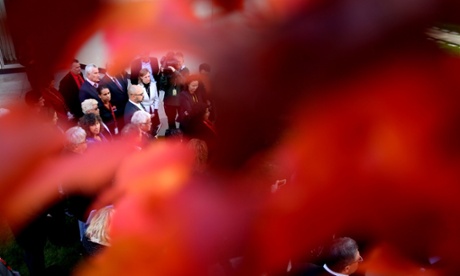
Here's a unique perspective on a press conference from earlier from welfare groups. They are framed through the budget tree, in full colour.
Here's a little news snap from my colleague Bridie Jabour from that press conference:
The community sector is up in arms about the budget and held a mass press conference in the senate courtyard to air their grievances.
Gerard Thomas from the Welfare Rights Network said the budget was full of nasties.
"This is an old-fashioned budget of bashing unemployed, young people, single parents, and old people as well,” he said.
Emma Robertson from Australian Youth Affairs Coalition (which is incidentally losing funding) said there could be an upsurge in crime because of the changes to welfare for people under-30 which will see them go six months at a time without income support.
“I also think it leaves young people really vulnerable in the workforce, it might lead to them taking jobs where they’re not paid legitimately, they’re being exploited in the workplace but they’re forced to do it because they won’t be able to survive otherwise,” she said.
Updated
Queensland premier Campbell Newman, as I flagged before, is very cranky about Canberra's cuts. The budget has money for roads, and that's a tick.
But:
A big red cross is cutting health and education spending. It's not acceptable.
Newman says he wants an emergency COAG meeting to sort out the budget direction on schools and hospitals. He also doesn't like the co-payments. Newman predicts people will crowd emergency rooms to avoid the co-payment.
He says the budget lay up by Canberra is utterly transparent.
This whole thing seems like a wedge to get the states to ask for the GST to be raised.
Well, that's not the issue. This is not about the GST.
Queensland premier Campbell Newman has joined Mike Baird in going berko over the $80bn cut in last night's budget.
I'll chase down some quotes from him shortly.
But first, I'm delighted to bring you the news that budget season has seen the debut of what Lenore Taylor and I are calling The Whiteboard Sessions.
Background: We have a new office in Canberra which is slightly bigger than the cupboard we once occupied in the parliamentary press gallery. Our new office has a whiteboard. We have decided to invite various people in to make presentations on our white board on issues they feel strongly about.
Our first guest was Labor's transport spokesman Anthony Albanese. He visited us to fact check the government's infrastructure package from last night's budget.
A small crowd gathered. Given Albanese nailed his contribution in only one take (a very high benchmark), he got a round of applause.
Do watch. Albo's analysis contains a number of Alboisms which are a lot of fun.
We are very hopeful that infrastructure minister, Jamie Briggs will be our next guest. We don't know how sharp his drawing skills are. Hopefully, we'll find out.
My Twitter correspondent @poverandout tells me that Vilma – (if this is of course the same Vilma from breakfast television this morning – which I stress don't know) – also provided a testimonial for Kevin Rudd at the last election.
I'll let the readers play sleuth on Vilma.
Right now I need to keep moving with the state premiers, who are shouting to the hill tops about cost shifting.
And looking forward to lunchtime, a couple of things:
- Joe Hockey will give his budget speech to the National Press Club at 12.30pm.
- Clive Palmer is also having a rival budget luncheon today.
I'll keep you in the loop with both luncheons as best I can. With my three ears. (Regular readers will get that joke.)
As promised, here's the Vilma video.
I alerted readers earlier about Vilma the pensioner, taking on the prime minister on breakfast television this morning, over the changes announced in last night's budget. Incidentally I hope we'll have that for you on video shortly.
Called in to see Vilma Ward & Bulimba Senior Citizens today. Presented some fashion statement shopping bags. KRudd pic.twitter.com/kbNjx9mHE1
— Kevin Rudd (@MrKRudd) April 17, 2013
A reader by the name of "Patrick" on Twitter has sent me this snap of a lady called Vilma – and the former prime minister, Kevin Rudd.
(Abbott suggested this morning Vilma wasn't a big fan of the Coalition's. Vilma suggested her political views had nothing to do with the practical implications of the budget changes. I described this encounter as a little like [alleged] "Stooge" on [alleged] "Scrooge".)
Baird is asked whether given the budget measures in health, he'll be imposing co-payments to keep people out of emergency rooms, as they are likely to go to emergency to avoid having to pay $7 at the GP.
Emergency rooms are a state responsibility.
Baird says he'll try and shield pensioners .. but:
We have to look at what impact that will have on emergency departments. I can't see any situation where I will ask pensioners to pay to go into emergency departments – I just can't see it.
We need to understand the implications for that policy announcements, what it does to queues and capacity in our emergency departments and we will consider that in detail.
Rolling on now to the premier of New South Wales, Mike Baird, who it's fair to say is going n-u-t-s about Joe Hockey's cost shifting last night in the budget.
Mike Baird has grabbed Tony Abbott's 'we are all in this together formulation' and lobbed it right back at the government.
Baird:
What we have had last night from the federal government is a flick pass, it's cost shifting, and it says to this state we have have a problem, you work it out.
Our message back to Canberra is: No, we are in this together – you cannot outsource your problems to the state, we have a huge array of challenges here, we are continuing to deal and look after the people of NSW, but we cannot have the cuts we have seen across the board, particularly in relation to health, and not have their support.
So they may well decide that they want to outsource their problems to the states. Well, that is not good enough.
We are saying to the Commonwealth you cannot make announcements such as last night without involving the states.
Back to Bill, who is still refusing to clarify Labor's position on the debt tax.
Shorten:
We will look at all these matters including the debt tax or the new income tax as it should be rightly called, in increasing at the highest marginal tax rate. We will look at this and respond in time but what we will say to Australian families is we've got your back when it comes to Medicare. We will stand up and fight for pensioners in this country and we do not support millions of motorists having to pay greater taxes on their petrol.
A journalist wants to know why Labor is unhappy about increasing the pension age to 70 when Labor increased it to 67. What is the difference?
Shorten:
70 is distinctly older.
(Distinctly. Older. Our office just erupted into howls of laughter.)
Nice of the PM to stop by the SMH post-budget dinner tonight w Peter Hartcher & Michael Gordon #budget2014 #auspol pic.twitter.com/6OVsZOkYcy
— Miranda Devine (@mirandadevine) May 13, 2014
Awww. Super nice, yes.
How are you all coping on the travelator? I assure you the day is only just warming up.
The Labor leader Bill Shorten is doing his first press conference of the day. He's with his health spokeswoman, Cathy King.
King:
Tony Abbott has twisted priorities when it comes to health. This is Tony Abbott destroying Medicare.
Shorten:
Tony Abbott is a clear and present danger to the universal accesible health care system in Australia.
Rugged out there, in breakfast TV land.
David Koch, Seven Network:
Q: On a morning like today, after the budget, are you a bit embarrassed that you had to break so many election promises?
Tony Abbott:
Kochie, this is a fundamentally honest budget. We were upfront with the Australian people about the difficult choices that had to be made.
We didn't cook the books. We didn't fiddle the figures. What we have done though is get the budget back to within cooey of surplus over the forward estimates, and along the way, we've got the world's biggest medical research fund and the Commonwealth's biggest ever infrastructure spend.
The prime minister seemed to think in his encounter with Vilma this morning that Vilma was not just a random concerned lady from the suburbs, but a Labor stooge. Abbott remarked that he thought Vilma did not vote for the Coalition at the last election. That's a polite way of saying, you are a stooge.
Vilma told the prime minister her objection to his pension changes had nothing to do with how she voted at the last election.
So the prime minister things Vilma is a stooge. And Vilma thinks the prime minister is Scrooge.
A tale of two pensioners
In one of the prime minister's television performances this morning, he met a lady called Vilma. Vilma is on the pension. She isn't very happy about the budget.
Vilma:
I have never heard such rubbish in all my life. Why don't you leave the pensioners alone? If we pull the belt any tighter we’re going to choke to death.
Tony Abbott:
Well Vilma, you've just given me a piece of your mind, and fair enough.
The Australian, however, had a happy pensioner in its pages this morning.
A story by David Crowe references the treasurer angsting over whether he'd gone too hard in this budget. But a pensioner wrote to Hockey, providing reasurance, and, apparently, a picture of her veggie patch. “Best of luck, hope all goes well for you,” she wrote to Hockey, according to the report by Crowe. “If the worst comes, it is better to be a good man than a bad politician. All my friends are behind you. All my hardworking frugal friends are behind you.”
Ray says he knows people who have been on the rock and roll since the 1970s. The rock and roll would appear to be the dole.
Don't worry Ray, says Tony. We are making sure those kiddies get off the couch.
The last thing we should be doing is encouraging youngsters to leave school and go straight on the dole. The dole is not preparing you for an unproductive life.
There was also banter about co-payments. The prime minister says it is possible that sick people may turn up at emergency if they face a $7 co-payment at the GP.
This is a possibility. I don't think it will happen nearly as often as people fear but it is a possibility.
I've just tuned into Ray Hadley, on 2GB. Hadley seems extremely attentive to the impact of the budget on his income and future income. He'd like to be sure this deficit tax isn't going to hang around for more than three years.
Oh look, the prime minister is on the line. This may prevent Ray talking about Ray for a moment. Unlikely, but let's stay tuned.
The interview is not entirely enhanced by the division bells blaring in the background. Ray is persisting. Ray doesn't mind a bit of white noise.
Abbott:
I know there is a lot in the budget that some people will find difficult.
But the prime minister says we are all in this together.
You, Ray.
Me, Tony.
Ray is deeply concerned that Labor might do something crazy – like vote against a cure for cancer. He's fearful there may be a double dissolution. Ray knows the prime minister is the eternal optimist, but these people, like Clive Palmer, "buffoons."
Abbott reassures Ray that these crossbenchers, well .. they are ..
unlikely to keep their seats after the next election.
(I'm sure Clive will be delighted by that observation.)
— simon benson (@simonbenson) May 13, 2014
Awww. Popular, the News Corp dinner. Labor's Anthony Albanese is picture here with the editor of the Daily Telegraph, Paul Whittaker.
PM stops by Daily Tele post #Budget2014 drinks according to tweets (pic keeps disappearing) pic.twitter.com/YnWneOKntg
— Helen Davidson (@heldavidson) May 13, 2014
From an unhappy media organisation to a happier one. Aww. Nice the prime minister swung past the News Corp budget dinner last night.
The ABC's managing director Mark Scott has added his voice to stakeholders unhappy with funding cuts and broken promises. The national broadcaster is going to lose the Australia Network contract, and take a funding cut overall.
As Katharine Viner reported last night: "The government is to pay $10.6m to the ABC for breaking its contract to produce the Australia Network. The contract’s cancellation will save the government $196.8m. But the 10-year contract with the ABC was worth $223m, so the $10.6m to be paid to the ABC in 2014-15 is about half the full cost of running the network. The main ABC and SBS face 1% budget cuts."
Scott said the government didn't consult before delivering the blow. He says its not clear how the ABC will meet its charter obligations to be an international broadcaster.
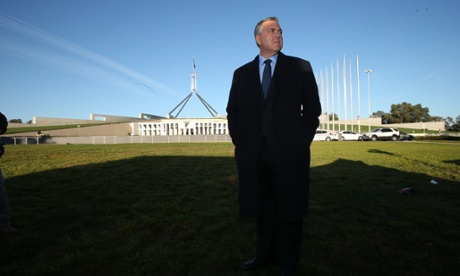
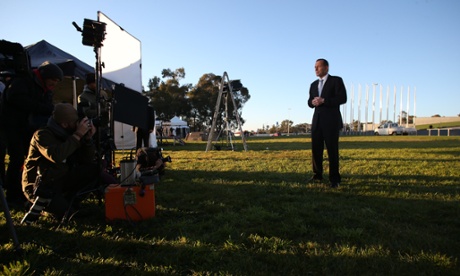
Good morning to Mike Bowers, who has been up since the wee small hours, on the spin circuit with prime minister and the treasurer.
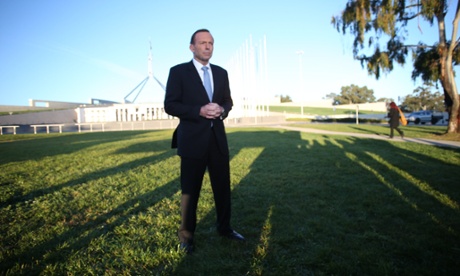
Very busy down there on the lawn this morning.
Let's talk about tax
Back now to state taxation, because I think it would help readers if I can decode this all a little bit.
The budget has made clear the Abbott government intends to go down the path forged by the Commission of Audit on the design and function of federation.
The Commission of Audit (delivered in the week before the budget) wanted all states to be sovereign in their own sphere – which is just a bit of code meaning states need to take more responsibility back from the Commonwealth for the delivery of services like health and education.
The COA wanted the tier of government closest to the people consuming public services to have responsibility for the service.
Joe Hockey in last night's budget has made a downpayment on this shift, by cutting $80bn from grants to the states over a decade. Hockey is now speaking about "their" hospitals and "their" schools.
As I've already said this morning, I think this positioning is a clear pathway to increasing the GST. Abbott is certainly not ruling that out this morning.
There is also another possibility. The COA recommended that the states be given a defacto income tax power – the capacity to tap into the Commonwealth's income tax base. Malcolm Fraser offered the states a similar deal when he was prime minister, but they knocked it back. Reading between the lines of what some of the state treasurers are saying this morning, they might not knock it back this time if that offer was forthcoming.
Some of the government's pension changes don't look all that promising either.
Q: What about the indexation of the pension being changed, will you oppose that?
Shorten:
Well you could have guessed, I suppose, that the Abbott government, if given a choice about picking the lowest form of indexation for all pensioners in Australia would actually pick that low form of indexation.
Q: So you oppose it?
We think it's a bad idea. We think in particular though telling people that they've all got to work till 70 goes against the grain of where this country's going.
The Labor leader Bill Shorten has followed Abbott on the ABC. He's opposed to the fuel indexation and the co-payments for the doctor.
But he's still equivocating on the deficit tax.
Q: Will you be opposing the debt levy?
Shorten:
With the debt levy, it is clearly a broken promise. It's a stunt by the Abbott Government to say that they're trying to do things which affect everyone, not just medium and low income families.
Having said that, our view is that our first priority is to defend Medicare, it's to defend middle and low income earners from the bad decisions of the broken promises of the Abbott Government.
Q: Sure, will you be opposing the debt levy?
We're not going to rule in, rule out everything line by line at this point. The budget came down last night.
Q: You've said many times you don't apologise for things. Do you think you should apologise for those promises that you had to break in order, in your mind, to fix this budget?
Abbott:
Well, I will let the Australian people pass judgment and it's not for me to pass judgment on myself. It's for me to give the best possible account that I can of what the government has done.
People like yourself, Chris, will pass judgment. The Labor Party will be squawking all day in the parliament – all complaint and no solutions – as you'd expect from the people who put us in this position.
I will let the Australian people pass their judgment at the next election, and I know that what they want is a government that isn't worried about its own political welfare but is worried about their long-term economic welfare.
(You noted the language right? "Their" hospitals, "their" schools. Over to you, state treasurers.)
The prime minister is being pushed on the cost shifting to the states, and asked will he allow an increase in the GST.
Abbott:
We think the states should take more responsibility for their public hospitals and for their public schools and we make no apologies for wanting the states to be grown up adult governments that take responsibility for the programs that are theirs, for the institutions that they run.
They should be grown up adult governments just as the Commonwealth should be a grown up adult government – and I hope that we made a giant step forward to being grown up adult governments last night.
Q: And where will they get the cash from? Do you need to lift the rate of the GST?
Look, that's not something that the Commonwealth is planning. Obviously we've got a tax reform white paper, we've got a federation white paper coming up in the next 18 months or so. The states are perfectly entitled to argue for change, if that's what they want. But each level of government should be sovereign in its own sphere. states run public hospitals, states run public schools and over time they should bear a larger share of funding.
Q: Are you open to raising the GST if they do raise it, remembering, of course, this is a Commonwealth law and the tax office collects this money so you have a huge stake in it?
But we are not touching the GST without the unanimous agreement of the states
Q: And if they come to you before the next election and say PM, we need more money?
That's a hypothetical, Chris, and let's see what they decide to do.
I'll double back to state taxation in a second but let's listen in now to the prime minister, Tony Abbott, who is on ABC radio.
Host Chris Ulhman is on about the broken promises. He's unhappy with Abbott's various formulations and rationalisations. Ulhman asks whether Abbott would have accepted formulations and rationalisations from Julia Gillard?
Abbott says the budget was not about saving the government's skin. The prime minister:
We were elected, Chris, not to make easy decisions, we were elected to make tough decisions, and not everyone is going to like them. But it's interesting that today all of the argument against this budget is a political argument. There's no economic argument against this budget.
Q: But just on that, did you break trust with the people, have you broken promises in this budget?
I think we've fundamentally kept faith with the people. I think we have fundamentally kept faith with the people.
This morning it's a simple case of pick your angle and wade on in. If you were with me on the live blog last night, you'll know the treasurer was forced to run the gauntlet of all the broken promises that are littered through this budget. This morning, Joe Hockey, is copping questions across the board, but state treasurers are clearly very concerned about the budget's clear direction on cost shifting to the states.
As my colleague Daniel Hurst reports: "The Abbott government will cut billions in planned health payments to the states and will put the handbrake on school funding increases, angering state and territory counterparts and setting the scene for renewed debate about raising the goods and services tax. The changes to hospitals and schools funding are set to save the federal government $80bn in total by 2024-25, the budget overview says."
This is a clear effort in my view to get the states to agree to an increase in the GST to fund these services. Hockey gave an even clearer signal on that this morning – he told Radio National if the states wanted to maintain "their hospitals and their schools" they would have to do what Canberra did all the time – look to the taxpayer.
That sounds like a GST hike to me.
Before we get to the account the government is giving of itself this morning, let me give you a snapshot of the account key commentators are giving last night's budget.
Tim Colebatch, in The New Daily
Those who will pay for most of the savings in this budget are families who are doing okay, who have their share of medical bills, do a lot of driving – and who thought before the election that Tony Abbott was their kind of guy. Well, think again. The first Abbott government budget is economically responsible, but politically full of risk, because it turns on his own supporters.
Laura Tingle, in The Australian Financial Review
This is a budget written by a government that thinks it has all the time in the world. Its short-term gradualism jars spectacularly with all the hysteria it hurled from opposition about budget crisis and debt. But assessing the weakened state of its opponents, Tony Abbott and Joe Hockey have used their first budget not to make immediate rapid cuts in spending but to maximise the time they have to implement major structural reforms of the budget without hurting a still-weak economy. In the medium term, some of the cuts are massive, even shocking, particularly to health and education. But in the short term, the lack of fiscal consolidation, underpinned by increased taxation, makes the Abbott government look like a bunch of girls.
Paul Kelly, in The Australian
This is a budget of genuine reform, the most substantial since 1996. The immediate numbers are not dramatic but the medium-term structural change has fiscal teeth and immense electoral risk. It is no horror budget yet there is real pain. It penalises wide sections of the community via medical co-payments, tightening of family benefits, fuel-excise indexation, the deficit tax and tougher rules for younger jobseekers. It defines the political battle of the first Abbott government — a choice between the need for community sacrifice versus anger at being punished by a government that broke its promises.
Ross Gittins, in Fairfax Media
This budget isn't as bad as Labor will claim and the Liberal heartland will privately think. It's undoubtedly the toughest budget since John Howard's post-election budget in 1996, but it's hardly austerity economics. I give Joe Hockey's first budgetary exam a distinction on management of the macro economy, a credit on micro-economic reform and a fail on fairness.
Well good morning everyone and welcome to the only day more intense than budget day – the day after budget day. I hope you've managed to absorb the government's vision for our fiscal future (welfare cuts and tax increases), and also survived the deluge of coverage that's hit you over the last twelve hours or so.
As is traditional on the day after B-day, key government folks are hitting the breakfast television circuit and the radio stations to flog what we've dubbed "the budget of destiny." (That's a borrow from Joe Hockey yesterday, who lobbed the D-word for B-day. It's ok. I will stop this shortly. Send coffee. I think it would help me.)
But before we wade bravely into the spin cycle – just in the event you've not yet summoned the will to deal with last night's announcements – here, for you, is the budget at a glance.
- Australians face a deficit tax for three years of 2% levied on incomes of over $180,000. (So that translates as $400 to Canberra if you are on a salary of $200,000.)
- There are a bunch of changes to welfare and family payments, winding back what the treasurer likes to call the age of entitlement.
- The changes include preventing people who are aged 30 or younger from getting unemployment benefits or youth allowance unless they’ve done an “employment services activity” for six months. There are some exceptions.
- The pension age increases to 70 in July 2035. From September 2017 (so after the next election) the age pension and the disability support pension will be indexed to inflation, not to wages. Asset and income test thresholds will be indexed between now and 2017, then eligibility thresholds will then be paused for three years.
- Family payments are also being trimmed. The family tax benefit part B income threshold is reduced to $100,000. For a typical family getting the base rate of family tax benefit part A, payments start to reduce when family income hits $94,316 a year.
- Sole parents and stay at home parents are the big losers. Cut through the fine print and this is the bottom line: people with children over the age of six will be prodded back into the workforce.
- The co-payments are there too for the doctor’s visits. That’s $7 a pop from July 2015 for patients who are normally bulk billed. The $7 also applies to tests and procedures, like pathology and imaging. For kids and concessional patients, the co-payment applies to the first ten services. There’s also an increase to the existing co-payment for prescription drugs – $5 for general patients.
- The monies raised by the co-payments will go to a new Medical Research Future Fund. That fund has a $20bn capital target by 2020. That was the one surprise in the budget – apart from the fine print of the nasties.
- Fuel excise indexation is back, as widely tipped. That raises $2.2bn over the forward estimates.
- University funding takes a massive haircut, and institutions will be able to charge students whatever fees they like.
- There’s new money for roads, particularly roads in western Sydney, but not quite as much new money as the government would like you to believe.
- The budget strips $80bn over a decade from grants to the states for hospitals and schools. This appears to be a rather patent attempt by Joe Hockey and Tony Abbott to get the states to agree to an increase in GST.
- And despite all the pain for middle Australia, the budget isn’t back in surplus for some time. We are looking at a budget balance in 2017-18 and a tiny weeny maybe surplus in the out years after that.
I'll be covering all the fallout throughout the day. Do join in with your comments, or if you want to chat to me on Twitter, you can follow me @murpharoo







